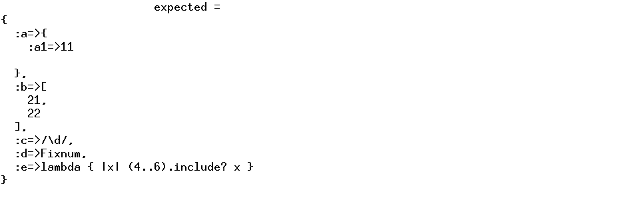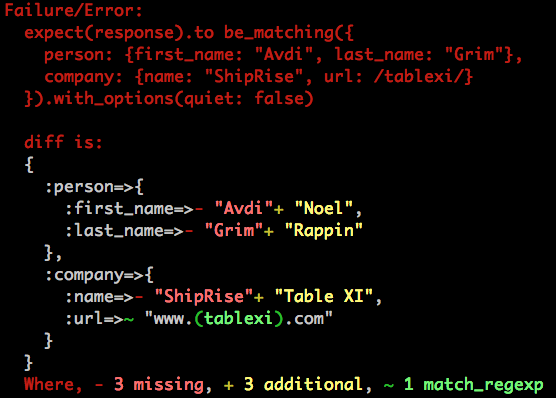DiffMatcher
Generates a diff by matching against user-defined matchers written in ruby.
DiffMatcher matches input data (eg. from a JSON API) against values, ranges, classes, regexes, procs, custom matchers, RSpec matchers and/or easily composed, nested combinations thereof to produce an easy to read diff string.
Actual input values are matched against expected matchers in the following way:
actual.is_a? expected # when expected is a class
expected.match actual # when expected is a regexp
expected.call actual # when expected is a proc
expected.matches? actual # when expected implements an RSpec Matcher interface
actual == expected # when expected is anything else
expected.diff actual # when expected is a built-in DiffMatcher
Using these building blocks, more complicated nested matchers can be composed. eg.
expected = { :a=>{ :a1=>11 }, :b=>[ 21, 22 ], :c=>/\d/, :d=>Fixnum, :e=>lambda { |x| (4..6).include? x } },
actual = { :a=>{ :a1=>10, :a2=>12 }, :b=>[ 21 ], :c=>'3' , :d=>4 , :e=>5 },
puts DiffMatcher::difference(expected, actual, :color_scheme=>:white_background)

Installation
gem install diff_matcher
Usage
require 'diff_matcher'
DiffMatcher::difference(expected, actual, opts={})
Simple matchers
Using plain ruby objects produces the following diffs:
+-------------+--------+-------------+
| expected | actual | diff |
+-------------+--------+-------------+
| 1 | 2 | - 1+ 2 |
| 1 | 1 | |
| String | 1 | - String+ 1 |
| String | "1" | |
| /[a-z]/ | 1 | -/[a-z]/+ 1 |
| /[a-z]/ | "a" | |
| 1..3 | 4 | - 1..3+ 4 |
| 1..3 | 3 | |
| is_boolean | true | |
+-------------+--------+-------------+
Where:
is_boolean = lambda { |x| [FalseClass, TrueClass].include? x.class }
When actual is missing one of the expected values
expected = [1, 2]
puts DiffMatcher::difference(expected, [1])
# => [
# => 1
# => - 2
# => ]
# => Where, - 1 missing
When actual has additional values to the expected
expected = [1]
puts DiffMatcher::difference(expected, [1, 2])
# => [
# => 1
# => + 2
# => ]
# => Where, + 1 additional
More complicated matchers
Sometimes you'll need to wrap plain ruby objects with DiffMatcher's built-in matchers, to provide extra matching abilities.
When expected is a Hash, but has optional keys, wrap the Hash with
a built-in Matcher
exp = {:name=>String, :age=>Fixnum}
expected = DiffMatcher::Matcher.new(exp, :optional_keys=>[:age])
puts DiffMatcher::difference(expected, {:name=>0})
# => {
# => :name=>- String+ 0
# => }
# => Where, - 1 missing, + 1 additional
When multiple expected values can be matched against, simply wrap them
in Matchers and || them together
exp1 = Fixnum
exp2 = Float
expected = DiffMatcher::Matcher.new(exp1) || DiffMatcher::Matcher.new(exp2)
puts DiffMatcher::difference(expected, "3")
# => - Float+ "3"
# => Where, - 1 missing, + 1 additional
Or to do the same thing using a shorter syntax
exp1 = Fixnum
exp2 = Float
expected = DiffMatcher::Matcher[exp1, exp2]
puts DiffMatcher::difference(expected, "3")
# => - Float+ "3"
# => Where, - 1 missing, + 1 additional
When actual is an array of unknown size use an AllMatcher to match
against all the elements in the array
exp = Fixnum
expected = DiffMatcher::AllMatcher.new(exp)
puts DiffMatcher::difference(expected, [1, 2, "3"])
# => [
# => : 1,
# => : 2,
# => - Fixnum+ "3"
# => ]
# => Where, - 1 missing, + 1 additional, : 2 match_class
When actual is an array with a limited size use an AllMatcher to match
against all the elements in the array adhering to the limits of :min
and or :max or :size (where :size is a Fixnum or range of Fixnum).
exp = Fixnum
expected = DiffMatcher::AllMatcher.new(exp, :min=>3)
puts DiffMatcher::difference(expected, [1, 2])
# => [
# => : 1,
# => : 2,
# => - Fixnum
# => ]
# => Where, - 1 missing, : 2 match_class
exp = Fixnum
expected = DiffMatcher::AllMatcher.new(exp, :size=>3..5)
puts DiffMatcher::difference(expected, [1, 2])
# => [
# => : 1,
# => : 2,
# => - Fixnum
# => ]
# => Where, - 1 missing, : 2 match_class
When actual is an array of unknown size and expected can take
multiple forms use a Matcher to || them together, then wrap that
with an AllMatcher to match against all the elements in the array in
any of the forms.
exp1 = Fixnum
exp2 = Float
expected = DiffMatcher::AllMatcher.new( DiffMatcher::Matcher[Fixnum, Float] )
puts DiffMatcher::difference(expected, [1, 2.00, "3"])
# => [
# => | 1,
# => | 2.0,
# => - Float+ "3"
# => ]
# => Where, - 1 missing, + 1 additional, | 2 match_matcher
When actual is matched against some custom logic, an object with an RSpec Matcher
interface can be used. (NB. #mathches?(actual), #description and #failure_message
methods must be implemented.)
So you can use one of the RSpec matchers or you can implement your own.
class BeAWeekend
def matches?(day)
@day = day
%w{Sat Sun}.include?(day)
end
def description
'be a weekend day'
end
def
"expected #{@day} to #{description}"
end
end
be_a_weekend = BeAWeekend.new
puts DiffMatcher::difference(be_a_weekend, 'Mon')
# => - expected Mon to be a weekend day+ "Mon"
# => Where, - 1 missing, + 1 additional
all_be_weekends = DiffMatcher::AllMatcher.new(be_a_weekend)
puts DiffMatcher::difference(all_be_weekends, ['Sat', 'Mon'])
# => [
# => R "Sat" be a weekend day,
# => - expected Mon to be a weekend day+ "Mon"
# => ]
# => Where, - 1 missing, + 1 additional, R 1 match_rspec
Matcher options
Matcher options can be passed to DiffMatcher::difference or DiffMatcher::Matcher#diff
or instances of DiffMatcher::Matcher
First consider:
expected = DiffMatcher::Matcher.new([1])
puts expected.diff([1, 2])
# => [
# => 1,
# => + 2
# => ]
Using :ignore_additional=>true will now match even though actual has additional items.
It can be used in the following ways:
expected = DiffMatcher::Matcher.new([1])
puts expected.diff([1, 2], :ignore_additional=>true)
# => nil
or
expected = DiffMatcher::Matcher.new([1])
puts DiffMatcher::difference(expected, [1, 2], :ignore_additional=>true)
# => nil
or
expected = DiffMatcher::Matcher.new([1], :ignore_additional=>true)
puts expected.diff([1, 2])
# => nil
Now consider:
puts DiffMatcher::Matcher.new([Fixnum, 2]).diff([1])
# => [
# => : 1,
# => - 2
# => ]
Using :quiet=>true will only show missing and additional items in the output
puts DiffMatcher::Matcher.new([Fixnum, 2]).diff([1], :quiet=>true)
# => [
# => - 2
# => ]
:html_output=>true will convert ansii escape colour codes to html spans
puts DiffMatcher::difference(1, 2, :html_output=>true)
# => <pre>
# => <span style="color:red">- <b>1</b></span><span style="color:yellow">+ <b>2</b></span>
# => Where, <span style="color:red">- <b>1 missing</b></span>, <span style="color:yellow">+ <b>1 additional</b></span>
# => </pre>
Prefixes
A difference string is similar in appereance to the .inspect of plain
ruby objects, however the matched elements it contains are prefixed
in the following way:
missing => "- "
additional => "+ "
match value =>
match regexp => "~ "
match class => ": "
match matcher => "| "
match range => ". "
match proc => "{ "
match rspec => "R "
Colours
Colours (defined in colour schemes) can also appear in the difference.
Using the :default colour scheme items shown in a difference are coloured as follows:
missing => red
additional => yellow
match value =>
match regexp => green
match class => blue
match matcher => blue
match range => cyan
match proc => cyan
match rspec => cyan
Other colour schemes, eg. :color_scheme=>:white_background will use different colour mappings.
Similar gems
String differs
- http://difflcs.rubyforge.org (A resonably fast diff algorithm using longest common substrings)
- http://github.com/samg/diffy (Provides a convenient interfaces to Unix diff)
- http://github.com/pvande/differ (A simple gem for generating string diffs)
- http://github.com/shuber/sub_diff (Apply regular expression replacements to strings while presenting the result in a “diff” like format)
- http://github.com/rattle/diffrenderer (Takes two pieces of source text/html and creates a neato html diff output)
Object differs
- http://github.com/tinogomes/ssdiff (Super Stupid Diff)
- http://github.com/postmodern/tdiff (Calculates the differences between two tree-like structures)
- http://github.com/Blargel/easy_diff (Recursive diff, merge, and unmerge for hashes and arrays)
JSON matchers
- http://github.com/collectiveidea/json_spec (Easily handle JSON in RSpec and Cucumber)
- http://github.com/lloyd/JSONSelect (CSS-like selectors for JSON)
- http://github.com/chancancode/json_expressions (JSON matchmaking for all your API testing needs)
Why another differ?
This gem came about because rspec doesn't have a decent differ for matching hashes and/or JSON.
It started out as a pull request, to be implemented as a
be_hash_matching rspec matcher,
but seemed useful enough to be its own stand alone gem.
Out of the similar gems above, easy_diff looks like a good alternative to this gem. It has extra functionality in also being able to recursively merge hashes and arrays. sub_diff can use regular expressions in its match and subsequent diff
DiffMatcher can match using not only regexes but classes and procs. And the difference string that it outputs can be formatted in several ways as needed.
As for matching JSON, the matchers above work well, but don't allow for matching patterns.
Update 2012/07/14:
json_expressions (as mentioned in Ruby5 - Episode #288) does do pattern matching and also looks like a good alternative to diff_matcher, it has the following advantages:
- define capture symbols that can be used to extract values from the matched object
- (if a symbol is used multiple times, it will make sure all the extracted values match)
- can optionally match unordered arrays (diff_matcher only matches ordered arrays)
- because it doesn't bother generating a pretty difference string it might be faster
Use with rspec
To use with rspec, require it in spec_helper.rb
require 'diff_matcher/rspec' # for RSpec version < 3.0
require 'diff_matcher/rspec_3' # for RSpec version >= 3.x
And use it with:
describe "hash matcher" do
subject { { :a=>1, :b=>2, :c=>'3', :d=>4, :e=>"additional stuff" } }
let(:expected) { { :a=>1, :b=>Fixnum, :c=>/[0-9]/, :d=>lambda { |x| (3..5).include?(x) } } }
it { should be_matching(expected).(:ignore_additional=>true) }
it { should be_matching(expected) }
end
Will result in:
Failures:
1) hash matcher
Failure/Error: it { should be_matching(expected) }
{
:a=>1,
:b=>: 2,
:c=>~ (3),
:d=>{ 4,
+ :e=>"additional stuff"
}
Where, + 1 additional, ~ 1 match_regexp, : 1 match_class, { 1 match_proc
# ./hash_matcher_spec.rb:6:in `block (2 levels) in <top (required)>'
Finished in 0.00601 seconds
2 examples, 1 failure
Comparing to built-in rspec matcher
RSpec 3 now has a built-in complex matcher:
RSpec.describe "a complex example" do
let(:response) {{person: {first_name: "Noel", last_name: "Rappin"},
company: {name: "Table XI", url: "www.tablexi.com"}}}
it "gets the right response" do
expect(response).to match({
person: {first_name: "Avdi", last_name: "Grim"},
company: {name: "ShipRise", url: a_string_matching(/tablexi/)}
})
end
end
With --color set, will result in:

But using diff_matcher:
require "diff_matcher/rspec_3"
RSpec.describe "a complex example" do
let(:response) {{person: {first_name: "Noel", last_name: "Rappin"},
company: {name: "Table XI", url: "www.tablexi.com"}}}
it "gets the right response" do
expect(response).to be_matching({
person: {first_name: "Avdi", last_name: "Grim"},
company: {name: "ShipRise", url: /tablexi/}
}).(quiet: false)
end
end
With --color set, will result in:

ie. by making these changes:
--- more_tapas_spec.rb 2017-03-02 19:51:26.000000000 +1100
+++ even_more_tapas_spec.rb 2017-03-02 20:41:52.000000000 +1100
@@ -1,11 +1,13 @@
+require "diff_matcher/rspec_3"
+
RSpec.describe "a complex example" do
let(:response) {{person: {first_name: "Noel", last_name: "Rappin"},
company: {name: "Table XI", url: "www.tablexi.com"}}}
it "gets the right response" do
- expect(response).to match({
+ expect(response).to be_matching({
person: {first_name: "Avdi", last_name: "Grim"},
- company: {name: "ShipRise", url: a_string_matching(/tablexi/)}
- })
+ company: {name: "ShipRise", url: /tablexi/}
+ }).with_options(quiet: false)
end
end
NB. Its not as easy to see with RSpec's built-in complex matcher that the url actually matched in the above example.
Contributing
Think up something DiffMatcher can't do! :) Fork, write some tests and send a pull request (bonus points for topic branches), or just submit an issue.
Status
Our company is using this gem to test our JSON API which has got above and beyond a stable v1.0.0 release.
There's a pull request to use this gem in a be_hash_matching
rspec matcher.




